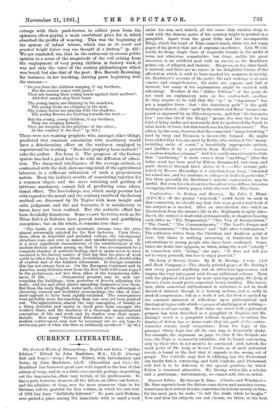CURRENT LITERATURE.
The Poetical Works of Thomas Gray : English and Latin. " Aldine Edition." Edited by John Bradshaw, M.A., LL.D. (George Bell and Sons.)—Gray's Poems. Edited, with Introduction and Notes, by John Bradshaw, LL.D. (Macmillan and Co.) —Dr. Bradshaw has bestowed great care with regard to the text of this edition of Gray, and he is a little over-careful, perhaps, in pointing out the inaccuracies, often very trivial, of his predecessors. So fine a poet, however, deserves all the labour an editor can-bestow, and the admirers of Gray, now far more numerous than in his lifetime, will be grateful for this volume, in which his own text of 1168 has been "faithfully followed." No poet, said Dickens, ever gained a place among the immortals with so small a book under his arm, and, indeed, all the verse that entitles Gray to rank with the famous poets of his country might be printed in a pamphlet. Apart from the great Odes and the incomparable Elegy, which the hand of Time cannot touch, there are not many pages of his poetry that are of supreme excellence. Like Words- worth, he drops single lines of exquisite beauty in the midst of verse not otherwise remarkable ; but Gray, unlike his great successor, is an artificial poet with an excess, as Dr. Bradshaw points out, of allegory and rhetoric. His prose, on the other hand, is natural, and there are no traces in his delightful letters of the affectation which is said to have marked his manners in society. Dr. Bradshaw's account of the poet's life and writings is at once concise and comprehensive ; his notes are copious and full of interest, but many of his explanations might be omitted with advantage. Readers of the "Aldine Edition" of the poets do not need an explanatory note on the curfew-bell,--neither do they require to be told that the " in " in " ingenuous " has not a negative force ; that " the churchway path " is the path leading to church ; that " spelt by the unlettered Muse means com- posed or engraved by an illiterate person ; and that "his favourite tree " (see line 110 of the Elegy) " means the tree that he was fond of lying under, not necessarily that he preferred the beech to other kinds of trees, but this beech was his favourite resort" The editor, by-the-way, observes that the compound " many-twinkling " used by Gray and Thomson is incorrectly formed. He might have added that it is also used by Keble, who writes of the "many- twinkling smile of ocean," a beautifully appropriate epithet, and justifies it by a quotation from lEschylus ". . . worTlaw TE KVf(RTwy levhpienov 74Aacrp.a." And it is surely unnecessary to state that " maddening" is more correct than " madding," after the latter word has been used by Milton, Drummond, and Gray, and made classical through their choice of it. —The volume pub- lished by Messrs. Macmillan is a selection from Gray, " intended for school use, and for students in colleges in India in particular." For them probably Dr. Bradshaw's minute explanations may be useful. But even for school service the editor is too diff use, his notes occupying about ninety pages, while the text fills fifty-three.


















































 Previous page
Previous page